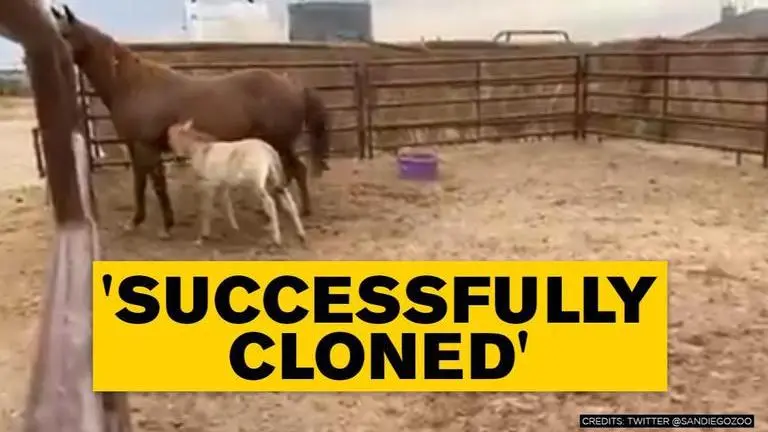Updated 15 September 2020 at 16:32 IST
Good News: Zoo successfully clones DNA of 40-year-old horse, shares video of newborn
Marking another remarkable scientific advancement, a foal was successfully born from cloning. San Diego made the attempt to save the endangered species.
- Entertainment News
- 2 min read

Marking another remarkable scientific advancement, a foal was successfully born from cloning. San Diego zoo, located in the US, in a press release revealed that a foal belonging to an endangered species was born after their officials cloned the DNA of a 40-year-old horse. The foal from Przewalkski breed marked the one of its kind effort to save the near extinct species.
As per the release the horse, born on August 6, was he was cloned at Texas Veterinary Facility and gestated inside a domestic surrogate mother. Originally found in Europe and Asia, the Przewalkski breed has suffered major population evaporations as a result of human activities. Meanwhile, sharing a short clip of the baby horse, the zoo wrote, “This species, once extinct in the wild, has started to be reintroduced into its native ranges.”
Breaking: The world’s first successfully cloned Przewalski’s horse 🐴 was born at Timber Creek Veterinary. This species, once extinct in the wild, has started to be reintroduced into its native ranges. pic.twitter.com/bYloCfQdWO
— San Diego Zoo (@sandiegozoo) September 13, 2020
Since shared the video has been viewed over 905. Thousand times with many congratulating the experts for their feat. While many others even compared it to Jurassic Park resurrections others have poured in the post with questions.
Advertisement
Is cloning a good idea?
— MALL OF THE UNITED STATES OF AMERICA (@MALLOFTHEUSA) September 13, 2020
How do they breed them from this?
— 塩漬け姐さん🇯🇵 (@katsubusio) September 14, 2020
Do they keep another DNAs of Przewalski’s horses (male or female) for breeding?
That is too cool. Can we bring back the Tigers too?
— Jacqui Linder (@QuietSpringMT) September 14, 2020
This is so amazing! And what a cutie 😍😍😍
— MerryLew (@BabyfreshBolt) September 13, 2020
Congrats! He’s adorable.
— GerriN 🥃 (@GERRI53N) September 13, 2020
Named Kurt
The cloned foal has been named Kurt in honour of one the founding members of Diego Frozen Zoo. According to the release, he will be moved to San Diego Zoo Safari Park and integrated into a real breeding herd. Experts are now hoping that in future, he might reproduce and increase the count of the horse.
Advertisement
Sepeprately, the Zoo also revealed that a pair of rare Amur leopard cubs were now in their outdoor housing. The two cubs were born April 26 and have not yet been named. They are the second litter for their mother, Satka, who keeps an eye on them as they explore and play. "The cubs are climbing up on the rocks, they are getting into the trees, sometimes listening to mom and sometimes not," said Kelly Murphy, senior wildlife care specialist, San Diego Zoo.
Published By : Riya Baibhawi
Published On: 15 September 2020 at 16:33 IST
